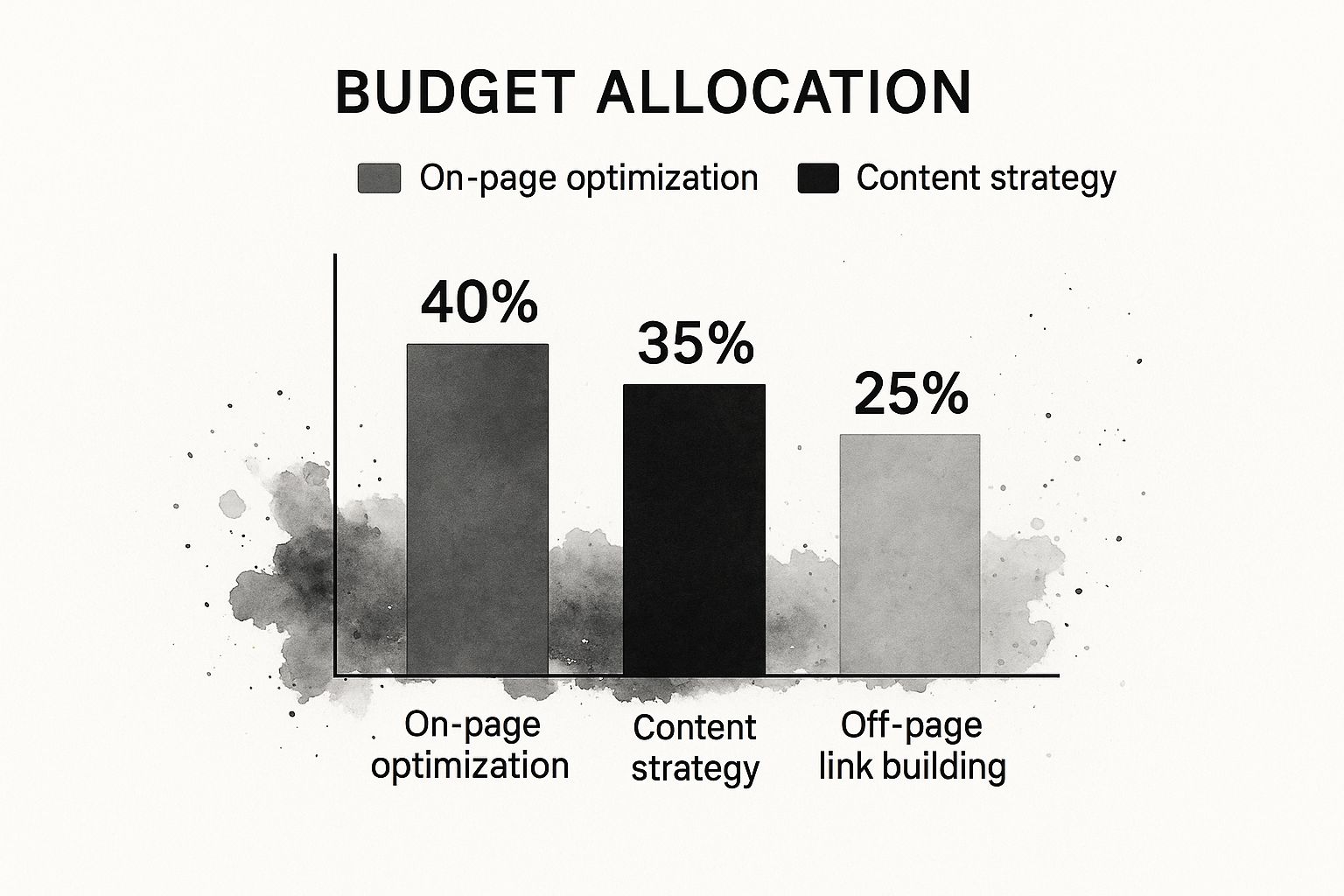Getting real results from SEO doesn't have to break the bank. In fact, smart, affordable search engine optimization is all about putting your time and money where it counts—on the activities that actually move the needle, not just burning cash on flashy services with no substance.
Building Your SEO Foundation on a Budget
So many small business owners I talk to think effective SEO is a luxury they can't afford. It's a huge misconception. This thinking either leads them to ignore SEO completely or, even worse, fall for some "cheap" SEO package that delivers absolutely nothing.
Here’s the truth: a solid foundation built on a few core principles can easily outperform a pricey campaign that’s all sizzle and no steak. This means getting your technical house in order, making smart content choices, and keeping your on-page SEO clean.
Globally, organic search drives about 53.3% of all website traffic. That makes it the single biggest source of visitors for most businesses. And since a whopping 75% of users never click past the first page of search results, a focused, budget-friendly SEO strategy is one of the most cost-effective ways to get in front of them.
Prioritize Technical Website Health
Before you even dream about keywords or backlinks, your website has to be technically sound. It’s non-negotiable. Search engines like Google aren't going to rank a site that's slow, buggy, or just plain frustrating to use.
A big piece of this is understanding Core Web Vitals. These are the metrics Google uses to measure a site's performance—things like loading speed, how quickly users can interact with your page, and whether things jump around as the page loads. They're a direct line to user experience, and Google cares a lot about them.
You can run a quick mini-audit yourself using free tools. Look for these red flags: * Slow Page Speed: Pop your URL into Google's PageSpeed Insights. How fast does it load? Be honest. * Mobile-Friendliness: How does your site look and feel on a smartphone? If it's a mess, you have a problem. * Broken Links: A bunch of 404 errors makes your site look neglected and hurts your credibility with both users and search engines.
I worked with a local bakery that was struggling to get online orders. It turned out their website was taking over eight seconds to load. We spent a few hours compressing images and cleaning up some code—costing them nothing but a bit of time. The result? They cut their load time down to two seconds and doubled their organic traffic in three months. No ad spend required.
Focus Your Budget on What Matters
This chart really breaks down how to think about allocating your resources for SEO when you're on a tight budget. It’s all about prioritizing on-page work, content, and just a little bit of strategic link building.

As you can see, the lion's share of your effort should go into your on-page SEO and content strategy. These are the areas that will give you the best bang for your buck when you’re just starting out. You can find more practical strategies like this over on our blog.
Here’s a simple way to think about where to put your energy and your limited funds.
High-Impact vs Low-Impact SEO Activities for Small Budgets
| SEO Activity | Budget Impact | Ranking Impact |
|---|---|---|
| Fixing technical SEO issues | Low (mostly time) | High |
| Creating helpful, keyword-focused content | Low to Medium | High |
| Claiming Google Business Profile | Low (free) | High (for local) |
| Basic on-page SEO (titles, metas) | Low (mostly time) | Medium |
| Complex backlink campaigns | High | High (but risky) |
| Expensive SEO tools | High | Low (if not used right) |
| Paid social media ads | High | Low (indirect impact) |
This table isn't exhaustive, but it should give you a clear idea: start with the free or low-cost fixes that directly impact how search engines and users see your site. That's where you'll get the quickest and most sustainable wins.
The smartest first step in any SEO campaign is fixing what's broken. A technically healthy website is the launchpad for all other marketing efforts. Without it, you’re just wasting money on content and ads that will never reach their full potential.
Creating High-Impact Content Without High Costs

Great content is the engine behind any real SEO success, but a lot of small businesses get scared off by the presumed cost. Let me tell you a secret: usefulness and depth almost always beat an expensive, high-volume content machine. An affordable search engine optimization strategy isn't about producing more; it's about producing better.
Forget the idea of churning out dozens of generic blog posts every month. Instead, what if you focused all that energy on creating one or two incredibly detailed resources? The kind that genuinely solves a real problem for your customers.
Picture a small e-commerce shop that sells hiking gear. They could absolutely outrank massive retailers by creating a single, definitive guide to "Choosing Your First Backpack." Fill it with personal insights, comparison tables, and even photos from actual customers. That one piece of content becomes an asset.
Uncover What Your Audience Is Asking
The key to creating content that hits the mark is answering the right questions. You don't need a suite of expensive tools to figure this out, either.
Start with free resources like AnswerThePublic. Even simpler, just type your main service into Google and look at the "People Also Ask" box. These are the exact phrases and long-tail keywords your potential customers are typing into the search bar. They signal high intent and usually have way less competition than the big, broad terms.
When you build your content around these questions, you guarantee it's relevant and valuable right out of the gate.
- For Service Pages: Structure these around the core problem you solve. If a plumber has a page on "Emergency Leak Repair," it needs to immediately talk about common causes, what to do right now, and why they're the ones to call.
- For Blog Posts: This is where you answer the "how-to," "what-if," and "why" questions that lead people to need your services in the first place. That same plumber could write a post on "How to Prevent Frozen Pipes in Winter" and become a trusted resource.
This approach creates content that doesn't just rank—it builds trust with your audience long before they ever think about making a purchase. If you need some pointers on structuring these pages for conversions, we have some solid insights on designing effective landing pages.
Go Deep, Not Wide
When you're working with a tight budget, depth is your best friend. In fact, research shows that content over 3,000 words can generate three times more traffic, four times more social shares, and 3.5 times more backlinks.
Why? Because comprehensive content becomes the go-to resource that other people want to link to. And with 92.3% of users now on the internet via mobile, making sure these long-form guides are perfectly formatted for small screens is a simple, no-cost way to keep every visitor engaged.
Don’t just write an article; create the definitive resource on a topic. Your goal should be to create a piece of content so thorough that your reader doesn’t need to go anywhere else. This is how you build authority and earn backlinks without a budget.
When you shift your mindset from high-volume production to creating strategic, valuable assets, you build a content strategy that drives real, long-term traffic and creates a loyal audience. This is the absolute cornerstone of affordable search engine optimization—investing your time and expertise where it delivers lasting returns.
Forget Paying for Backlinks. Earn Them Instead.
Backlinks are a massive piece of the SEO puzzle. Think of them as votes of confidence from other websites, signaling to search engines that your content is the real deal—valuable and trustworthy. But here’s the trap so many businesses fall into: they think they have to pay for them. That's not just expensive; it's a super risky game to play.
Let's be crystal clear: any affordable search engine optimization strategy has to be built on earning links, not buying them. This isn't about shady, transactional link building. It's about creating genuine relationships and providing so much value that people want to link to you naturally. Sure, it’s a slower process, but the results are legit and they actually last.
Create Something Worth Linking To
Honestly, the simplest way to earn backlinks is to create something that other people in your industry will genuinely want to reference. This is what we call a "linkable asset." It’s a piece of content so useful, interesting, or unique that linking to it becomes a complete no-brainer for other site owners.
Instead of pumping out yet another generic blog post, think bigger. What about creating:
- A Unique Industry Report: Survey your customers or dig into some public data to create a report with fresh stats no one else has.
- A Useful Calculator: A simple tool can be a link magnet for years. Think a mortgage calculator for a real estate agent or a project cost estimator for a contractor.
- An Ultimate Guide: Go deep. Create the most thorough, detailed resource on a specific topic in your niche.
For instance, a local contractor could build out a detailed guide on the "True Cost of a Kitchen Remodel in Austin," breaking down local permit fees and material costs. This instantly becomes an invaluable resource for homeowners and a natural link target for local real estate blogs or interior design sites.
Get Strategic with Outreach and Partnerships
Once you’ve created an amazing asset, you can’t just sit back and hope people find it. You’ve got to do some smart, targeted outreach. And no, I don't mean spamming hundreds of websites with a generic email. This is about building real connections.
One of the biggest myths in SEO is that link building is a numbers game. The truth? A single, high-quality backlink from a relevant, authoritative site is worth more than a hundred spammy, low-quality links. Always focus on quality, not quantity.
Guest posting is a classic for a reason—it works. Write a genuinely helpful article for another website in your niche. You give them awesome, high-quality content for free, and in return, you usually get a link back to your site in your author bio.
And don't sleep on local partnerships. Sponsoring a local charity 5K, teaming up with a complementary business, or getting featured on your city's official website are all fantastic ways to earn powerful local backlinks. It's a total win-win that drives both SEO value and strengthens your presence in the community.
Using Free SEO Tools Like a Pro
Let's get one thing straight: you absolutely do not need an expensive software subscription to start making smarter, data-driven SEO decisions. A truly affordable search engine optimization strategy is built on being resourceful, and honestly, the free tools from Google are more than powerful enough to get you going.
This isn't beginner stuff, either. The pros use this same core data. The only difference is you're getting it without the hefty price tag.
Master Your Google Power Tools
Your two most important tools are Google Search Console and Google Analytics. Think of them as the diagnostic dashboard for your website's health.
Search Console is your direct line to Google. It tells you exactly how the search engine sees your site, flagging technical problems and showing you which keywords are actually bringing people in. Analytics, on the other hand, picks up where Search Console leaves off, telling you what your visitors do once they land on your site. Together, they're a powerhouse.
Here’s a look at the Google Search Console dashboard. It gives you a quick, at-a-glance overview of your site's organic performance.

This snapshot shows crucial metrics like total clicks and impressions, making it easy to spot trends or sudden issues with your visibility in search results.
Then you have Google Analytics (specifically, GA4). This is all about user behavior. Once someone clicks from Google to your site, what happens next? Which pages do they visit most? How long are they sticking around? This is the data that tells you what content is resonating and what’s falling flat.
A Workflow for Quick Wins
Ready for some low-hanging fruit? Here’s a simple, actionable workflow you can use today to find an easy SEO win by combining the power of GSC with a little bit of your own elbow grease.
Find Your "Almost Ranking" Pages: First, log in to Google Search Console and head over to the Performance report. You're going to filter your results to find keywords where your average position is between 11 and 20. These are your "striking distance" pages—they're right there on page two, just waiting for a little push to get onto page one where all the action is.
Identify the Target: Now, look at the keywords driving impressions to these pages. Is there a clear winner? For instance, maybe a page is getting tons of impressions for "how to fix a leaky faucet" but it’s stuck way down at position 15. That's your target.
Time to Optimize: Go to that specific page on your website. Your mission is to beef up its on-page SEO. Make sure that target keyword is in your title tag, your meta description, and your main H1 heading. Can you add more helpful content? Maybe answer a few related questions people might have, or even embed a quick "how-to" video.
This simple process is a perfect example of strategic, affordable SEO in action. You’re using free data to pinpoint your best opportunities and then investing your time—not your money—to capitalize on them.
The goal isn't just to rank, but to understand why you rank. Free tools like Google Search Console give you the insights to move from guessing what works to knowing what works.
Beyond Google's own suite, a few other free tools can fill in the gaps. Google Keyword Planner is fantastic for initial brainstorming. The free version of Screaming Frog is another gem; it can crawl up to 500 URLs on your site to uncover technical issues you might have missed.
By getting comfortable with this small suite of free tools, you can run a professional-level SEO strategy on a startup's budget.
Winning Local SEO Without a Big Ad Spend

For most small businesses, forget trying to compete on a national stage. Ranking first in your own city is where the real money is. This is the heart of an effective, affordable search engine optimization plan—owning your local market without emptying your wallet on ads.
The good news? Local SEO is one of the most cost-effective strategies out there. It really levels the playing field, allowing a dedicated local shop to outrank much larger competitors that just don't have a strong community presence. Your biggest advantage is right there in front of you: your physical location and connection to the neighborhood.
Master Your Google Business Profile
Your Google Business Profile (GBP) is hands-down the most important free tool for local SEO. It's often the very first thing a potential customer sees, powering your visibility in the local map pack and search results.
Don't just set it and forget it. Treat your GBP like a dynamic mini-website. When you fully flesh it out, you're sending powerful signals to Google that you're an active, legitimate business. This means going way beyond just your name and address.
- Write a Compelling Description: Use every character you can to describe what makes your business unique. Tell your story.
- Upload High-Quality Photos: Show off your storefront, your team, and your products or services in action. Give people a reason to visit.
- Utilize Google Posts: Share updates, offers, and events directly on your profile. This keeps it fresh and shows Google you're engaged.
A complete and active Google Business Profile is non-negotiable for local success. In fact, businesses with complete profiles are 2.7 times more likely to be seen as reputable by consumers.
Build Trust with Reviews and Citations
Beyond your GBP, two other things are absolutely critical for building local authority: customer reviews and consistent business citations.
Reviews are pure social proof. Actively encouraging happy customers to leave feedback can give you a significant boost in the map pack rankings. It tells both Google and future customers that you're the real deal.
Equally important is ensuring your NAP (Name, Address, Phone Number) is identical everywhere it appears online. I mean identical. Any inconsistencies can confuse search engines and chip away at their trust in your business.
A great starting point is to get listed in key online directories. Building a solid, consistent foundation across these platforms is a simple but powerful way to improve your reach. You can explore a quality business https://rebelgrowth.com/directory to see the kind of listings that build real authority.
Another smart move is creating dedicated service area pages on your website. If you're a plumber who serves three specific neighborhoods, create a unique page for each one. This helps you capture super-specific searches like "plumber in Northwood" and proves your relevance in those communities.
Focusing on local SEO services for small businesses is often the first step for companies on a budget, and for good reason. This is your blueprint for becoming the go-to choice in your area.
Common Questions About Low-Cost SEO
Jumping into a low-cost SEO strategy for the first time usually brings up a lot of questions. That’s perfectly normal. Knowing what to expect, how to measure your progress, and when it might be time to call in a pro will help you stay on track and feel confident in your plan.
Let’s go through some of the most common questions I hear from business owners about doing SEO on a budget. My goal is to give you honest, straightforward answers so you know what you’re getting into.
https://www.youtube.com/embed/rDxKxWi7mXM
How Long Does It Take to See Results?
This is the big one, right? The honest, no-fluff answer is: patience is everything in SEO.
With a consistent, focused effort on affordable SEO, you can generally start to see some early signs of life—like small ranking improvements and a little more traffic—within 3 to 6 months.
But that timeline isn't set in stone. It really depends on a few things: your site's current condition, how tough the competition is for your keywords, and how consistently you’re actually doing the work.
For instance, fixing technical problems on your site can sometimes give you a relatively quick boost. On the other hand, creating great content and earning backlinks is a long game—it's an investment that builds momentum slowly over time.
Can I Really Do Effective SEO for Free?
You absolutely can, but there's a trade-off. What you save in dollars, you have to spend in your own time and effort.
By getting really good with powerful free tools like Google Search Console and Google Analytics, you can handle all the core tasks of SEO without paying for a single monthly subscription.
The "cost" is the hours you'll put into keyword research, writing genuinely helpful content, and building relationships to get those all-important backlinks. For a lot of small businesses or those in a specific niche, a dedicated DIY approach can be surprisingly effective, especially when you're just starting out.
The biggest mistake you can make with low-budget SEO is chasing quantity over quality. This usually looks like churning out dozens of thin, keyword-stuffed articles or building spammy links from totally irrelevant websites. Always focus on creating real value, not just hitting a number.
Another common pitfall is completely ignoring the technical side of your website. A slow site that looks terrible on a phone is never going to rank well, no matter how incredible your content is. And finally, giving up too soon is a classic mistake. SEO is a marathon, not a sprint.
When Should I Consider Hiring an SEO Expert?
It’s probably time to think about hiring a professional when you feel like you've hit a wall or your business has grown to a point where you have a real marketing budget to work with.
If you’ve nailed the basics but just can't seem to crack the top search results for your most important keywords, an expert can bring in advanced strategies and a deeper level of competitive analysis that’s hard to do on your own.
It's also a smart move if you're in a hyper-competitive market. In those situations, a DIY approach might not be enough to make a dent against bigger, more established players.
Ready to take your marketing beyond the basics? The rebelgrowth platform provides an AI marketing agent and a suite of tools designed to streamline your entire growth strategy, from SEO and content creation to social media management. Explore the possibilities.
